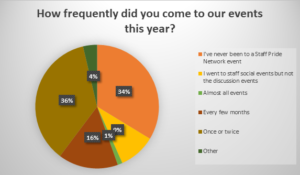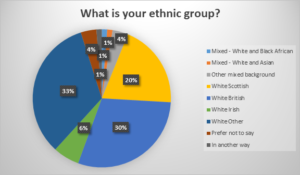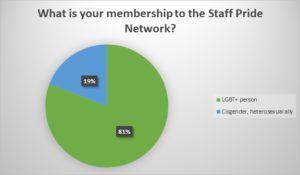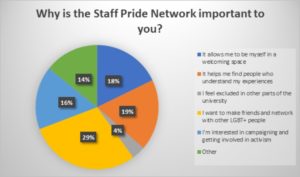Staff Pride Network Newsletter – Issue 7
|
||||||||||||||||||||||||||||||||||||||||||||||||||||||||||||||||||||||||||||||||||||||||||||||||||||||||||||||||||||||||||||||||||||||||||||||||||||||||||||||||||
|
||||||||||||||||||||||||||||||||||||||||||||||||||||||||||||||||||||||||||||||||||||||||||||||||||||||||||||||||||||||||||||||||||||||||||||||||||||||||||||||||||
|
|
||||||||||||||||||||||||||||||||||||||||||||||||||||||||||||||||||||||||||||||||||||||||||||||||||||||||||||||||||||||||||||||||||||||||||||||||||||||||||||||||||
|
||||||||||||||||||||||||||||||||||||||||||||||||||||||||||||||||||||||||||||||||||||||||||||||||||||||||||||||||||||||||||||||||||||||||||||||||||||||||||||||||||
|
The opening on 24 May was a great success and the exhibition is now open to the public until 20 October. Go see!
National Museum of Scotland exhibition information.
Review of exhibition in Vogue magazine.
The Staff Pride Network undertook this survey with the aim of improving our organisation and future events. Thank you for helping us learn by completing it.
80 people responded to the survey and answered 16 questions that touched upon attendance to events, the reasons why you find this network important, communication, approachability, and representation. You can find a copy of this report in SharePoint (you will find the graphics are easier to read there). A further more detailed report will be published later in the year.
Although some of the respondents (35%) expressed they have not attended any events organised by the network, some explained that it is important that the network exists. One of the respondents wrote: ‘It makes me feel secure and welcomed in the University that this network exists, so I want to support it and participate when I can’.

The reasons for not attending the events organised by the network were varied:
‘I act as the departmental lead/rep for this, but am not part of the LGBTQ+ community, so don’t feel the events are for me.’
‘Wasn’t aware of events.’
At the moment, 85% of you would feel able to approach us if you had an issue you wanted to discuss. These responses are very useful to us and will help us to improve our communications so you all feel welcome to attend and get notice of the events.
A theme of concern was that 5% of the respondents expressed they did not feel comfortable/included and 2.5% didn’t like the sound of the events. We understand that people prefer to engage in different ways and, therefore, we are working to react and improve to ensure that people feel included and comfortable.

The survey showed our membership is diverse in many ways, but we have much to do to increase BME representation.

We are pleased to see that 19% of our respondents are allies. It is important to acknowledge that our network is a diverse group and the LGBT+ umbrella does not capture the richness of our identities, as your responses showed us: ‘[I am] Asexual! But I fit that under “queer”’ and ‘I’ve been committed to a straight relationship forever, but feel that in another universe things could have been different. I’m happy though. But I don’t really know how to label that. Operationally straight/theoretically pan?’

In response to this question, some of our members answered in ways that were reassuring and heart-warming. Quotes include:
‘I am impressed by the many efforts the LGBT+ staff group puts into its work, and I know that this is widely appreciated.’
‘I want to use Staff Pride to make the university more welcoming, to challenge prejudice, and effect meaningful change.’
‘It inspires me how to teach my kids about valuing diversity’.
‘I had a difficult time to come out to myself, the SPN started exactly at that point and it helped me very much to know that some LGBT+ colleagues were there, visible. I could not do it, I am not comfortable enough to share my sexual orientation with others, but I am so thankful that you guys are here! And maybe someday I will do it too.’
We were overwhelmed with the positivity and love for what we are doing. You brought joyous tears to our eyes and gave us lots to think about for where to improve our work, events, and activities. Thank you.
This article is written by EUSA. The Staff Pride Network are in support of this Rally for Trans Solidarity which is organised by EUSA.
Prior to the Pride Edinburgh march on Saturday 22 June, we’ll be meeting at Levels Cafe on Holyrood Road at 11.30am and plan to head to the march at 12ish for a 12.30 start. Join us at Levels so you can find us easily.
We are making placards for our beautiful posters so do let us know if you’d like to carry one. Look for the placards if you can’t get to Levels.
Time to get your beautiful UoE Staff Pride Network t-shirt for the march (or for your wall/presentation cabinet/sleeping shirt)! First round deadline is 10.30am Tuesday 4 June, so please get your orders in soon! Many thanks to April for organising this.
Cost price is £13.20 including VAT, so that’s all you pay.
Ideally you will be able to pick them up at a Central location by Friday 21 or we can send by internal mail. Closer to the time we may be able to deliver to other campuses.
Join us for the launch of ‘Evidence Base: Growing the Big Grant Club’ on the 21 of June 2019 in the Royal Society of Edinburgh.
Evidence Base formed in 2018 with funding from the EPSRC to promote and execute a systems based approach to understanding issues of equality, diversity and inclusion in STEM.
“Growing the Big Grant Club” aims to research the under representation of women in the big grant club (grant awards of £5m+). Over the past 10 years, of the big grants funded by the EPSRC, less than 5% have gone to women.
Our project is a wide-reaching collaboration involving the University of Edinburgh (Professor David Robertson, Professor Polly Arnold, Professor Karen Halliday, Dr Sara Shinton, Dr Job Thijssen, Dr Emily Porth), University of Nottingham (Dr Karen Salt), Royal Society of Chemistry, Institute of Physics, UKRI and the Knowledge Transfer Network.
Our approach is to understand this social issue from the systems-level, avoiding falling into the trap of taking a ‘deficit model’ approach whereby the interventions are aimed at ‘upskilling’ or ‘fixing’ the women. We want to fix the system that is failing to accommodate diversity.
Please join us for an afternoon of food, entertainment and discussion to mark the official launch of ‘Growing the Big Grant Club’. You will have the opportunity to meet many of our project partners as well as hear about the research we are undertaking.
Registration can be made via eventbrite. A full programme of activities will be shared at the beginning of June.
Recently, University of Edinburgh staff, including Andy Kordiak and Peter Hayakawa from the University Procurement Office, participated in intensive trainings and discussions on ways to promote equality through public procurement for those who share protected characteristics (including age, disability, gender reassignment, marriage and civil partnership, pregnancy and maternity, race, religion or belief, sex or sexual orientation). UK public bodies like the University of Edinburgh collectively spend billions of pounds annually through purchasing with third party suppliers, and thus have a lot of potential influence with industry to promote equality and better working conditions. These half-day sessions led by the Equalities and Humans Rights Commission (EHRC) were aimed at partners of Scotland’s City Region Deals, a set of agreements between Scottish Government, the UK Government and local governments and other public partners to strategically improve regional economies. The University of Edinburgh is key partner of the Edinburgh and South East Scotland City Region Deal (ESESCRD) leading its Data Driven Innovation Programme; through this the region’s councils and higher education institutions have committed to deliver inclusive growth, combining economic growth with greater equality and opportunities for all, through a series of major investments. One big challenge is to leverage the major pipeline of procurement spend to achieve a collaborative, common approach to promoting inclusion and equality in supply chains.
The training was wide-ranging, but EHRC highlighted the often overlooked duties in the 2010 UK Equality Act to take positive action to promote equality in organisational activity, rather than the better-known duties to avoid discriminatory behaviour. EHRC and attendees discussed allowable ways to take positive actions to promote equality, for instance, gender parity in industries like construction or health and social care. The University has worked over the last years with partners, in particular the University’s Staff Pride Network, to incorporate equality in its procurement, for instance highlighting equality duties in supplier documentation and requiring information and positive action from suppliers, but we will look forward working more closely with regional partners and organisations like EHRC, with the aim to increase the impact of measures like these. As a first step after the training, the University Procurement Office supplemented the Scottish Government Equality in Procurement measures that we currently refer to in our sustainable procurement process with EHRC’s guidance on Responsible Procurement of Cleaning Services for this high risk area.
The University is required by the Further and Higher Education Act 1992 to submit statistical returns to the Higher Education Statistics Agency (HESA), under category labels set down by HESA.
Institutions are now able to report staff sex under three categories: ‘male’, ‘female’ and ‘other’. Although the naming of this last category is far from ideal (!), it does now allow reporting of staff who define as anything other than male or female.
In future this data will be captured via a self-service portal in the new HR system. Until this is in place, any staff who wish to be returned to HESA under the ‘other’ sex category should send an email to the confidential mailbox equalitydiversity@ed.ac.uk.
With regards to recording sex in University of Edinburgh job applications, colleagues are working on changes, and we hope to provide an update in the near future.
Thanks if you have already put up Staff Pride Network posters around your building, on noticeboards, in staff rooms etc… Posters share our common message, and it would be great to have these displayed in all buildings around the University.
We have printed 300 posters, and there are still plenty to collect and distribute, so your input is welcome here. Posters can be collected from Allies Rep Carol (carol.dow@ed.ac.uk) at the School of Informatics and Callum (Callum.Michie@ed.ac.uk) at the KB Copy Centre in the James Clerk Maxwell Building. Get in touch with them if you need posters sent to you.
Check out the designs on SharePoint.
The School of Informatics held its annual Jamboree on Friday 26th April.
The day is a social gathering for staff and their families to come along and take part in activities such as a silent disco, a tango class, a pub quiz, arts and crafts, board games. This all followed with a ceilidh in the evening. There was also a visit from alpacas who greeted us at George Square.
The Staff Pride Network had their first stall at the jamboree last year, and this year it was even bigger and brighter than before. It was extremely well attended and hopefully our message was passed across successfully.
Carol Dow (carol.dow@ed.ac.uk)